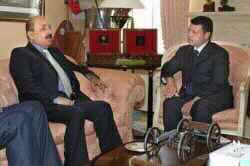HIGHLIGHTS: Baghdad Appears to be Preparing for a Dual Strategy Approach to its Heated Confrontation with the United States and Britain||No Evidence from Aerial Photos to back Claims that Iraq Has Weapons of Mass Destruction or is Trying to Build them, Rather a Number of Open Questions, Says Blix||World Community Urges Iraq to Allow UN Weapons Inspectors Back; Russia Rejects Ultimatums|| Debate Among U.S. Allies Shifts from Whether Washington Should Confront Iraq to How|| STORY: In what appeared to be a dual Iraqi strategy approach to its heated confrontation with the United states and Britain, one senior Iraqi official, Iraqi Vice President Taha Yassin Ramadan, on Tuesday called, in Jordan, on Arabs to rise and "confront" America, another official, Foreign Minister Naji Sabri, said, in Baghdad on Monday, Iraq wanted to be a trade partner, not a battlefield foe, with the United States.
In the United Nations, meanwhile, U.N. chief arms inspector Hans Blix said there was no evidence from aerial photos or other sources that Iraq has weapons of mass destruction or is trying to build them. But he added there are still "many open questions" about Iraq's weapons programs that need to be answered.
He urged Iraq to allow U.N. inspectors back and reiterated that if Baghdad cooperated fully with inspections he could recommend that the Security Council suspend sanctions within a year.
Ambassador Sergei Lavrov of Russia, Iraq's closest U.N. ally, said all 15 council members agree that "the speedy return of inspectors to Iraq is in everybody's interest, including the Iraqi population and including the interests of regional security."
But he said Russia is "against ultimatums in principle."
Speaking to reporters after a closed-door council meeting on his latest report, Blix said satellite photos show that Iraq has carried out rebuilding at sites that were bombed in 1998, "but this is not the same as saying there are weapons of mass destruction."
"The satellites don't see through roofs," he said. "So we are not drawing conclusions from them, but it would be an important element in where maybe we want to go to inspect and monitor."
Washington accuses President Saddam Hussein of harboring terrorists and possessing weapons of mass destruction. President Bush said he hasn't yet decided whether to attack Iraq but he insists that Saddam must be removed from power.
Both Britain and Italy expressed strong support for the United States.
Saudi Arabia, meanwhile, joined European nations in saying the United States should work through the United Nations to contain any possible Iraqi threat.
President Bush's administration, trying to build world support as it considers military action to oust Saddam, says debate among its allies has shifted from a question of whether the United States should confront Iraq to how.
Bush said Tuesday he will ask the United Nations "to deal with the problem."
Arab nations have staunchly opposed any military action against the Iraqi leader, saying it would throw the Middle East into turmoil. The Saudi foreign minister, Prince Saud al-Faisal, said an attack would lead to the dismemberment of Iraq, but suggested Riyadh would follow the U.N.'s lead.
PHOTO CAPTION
Iraqi Vice President Taha Yassin Ramadan, left, meets with Jordan's King Abdullah II in Amman, Jordan on Tuesday Sept. 10, 2002. Ramadan is on a diplomatic offensive against President Bush's threat to oust Iraqi leader Saddam Hussein. (AP Photo/Leila Gorchev, Poo
- Author:
& News Agencies - Section:
WORLD HEADLINES


 Home
Home Discover Islam
Discover Islam Quran Recitations
Quran Recitations Lectures
Lectures
 Fatwa
Fatwa Articles
Articles Fiqh
Fiqh E-Books
E-Books Boys & Girls
Boys & Girls  Ramadan
Ramadan Fatwa Audios
Fatwa Audios Month of Mercy
Month of Mercy Women
Women Eed Al- Fitr
Eed Al- Fitr Food Recipes
Food Recipes Videos
Videos

 Prayer Times
Prayer Times












